Gary Neal Hansen's Blog, page 17
December 3, 2020
The Zoom Christmas Pageant!

 CC by Nicole Waleczek (WMDE)-SA 4.0
CC by Nicole Waleczek (WMDE)-SA 4.0Okay, it’s December. It’s Advent. Christmas is coming. But it’s also a pandemic, and church is back to being online, not in person. How are we going to have a Christmas pageant? It’s time for the Zoom Christmas Pageant!
The Zoom Christmas Pageant!
A few years back I wrote a Christmas play. Better to say I edited it: the entire text is from the Gospels. I was thinking of it as a “readers theatre” production where the players would sit in a row of chairs and read their parts instead of acting them out.
I thought it would be way easier that way. No costumes. No sets. No props.
I thought it would be good to focus completely on the biblical story — no side trips into moaning about commercialism or materialism or other modern botherations.
I gave it a very creative title. I called it “Christmas Play.”
I just wove together the Gospel material:
John’s prologue set it up, highlighting the coming of the Word.
Matthew and Luke provided the action, their very different story elements woven into a single narrative.
John’s prologue closed it out, celebrating the light which the the darkness cannot overcome.
Readers Theatre Becomes Fully Staged Production
As I worked out the harmonized story, I kept seeing the action in my head. I thought
Why not stage it?
I offered it to the folks who did the pageants each year at our church. They said
Sure — but you have to direct it
So I did. I chronicled it here on the ol’ blog.
My Little Play Goes Public
Then I decided to offer it to the world. I put it out on Amazon in both Kindle and paperback formats. (That’s an affiliate link, by the way.)
And I set it up so that people could purchase licenses to produce the play through this very website.
And they did. Not a huge number, but a few every year, and from all over the country.
Back to Reader’s Theatre: The Zoom Christmas Pageant!
Then in 2020 a former student, now a pastor, emailed to ask
Could I get a license to produce the play for a Zoom service in Advent?
I said
Well of course! What a great idea.
So if you are scrambling to find ways to do all the Advent worship traditions that make Christmas feel like Christmas, despite the fact that you are all at home and worshipping via technology, think about the Zoom Christmas Pageant.
It’s actually pretty easy. Readers theatre and Zoom go together perfectly
You buy the production license with permission to make copies of the script for all your players.
You divvy out the parts.
Maybe you have a rehearsal or two to make sure everyone’s on the same digital page.
When it’s time for the service, get all the players on line with webcams and mics turned on.
Everyone reads their own part.
Together your congregation experiences the whole Christmas story, exactly as the Gospels present it.
My Solution to the 2020 Advent Problem
I hope you’ll think about using my Christmas Play for your Zoom Christmas Pageant.
It’s a great experience for the players — each one gets to think and feel their way through one biblical character in a new way.
It’s a great experience for the congregation — everyone gets to hear the whole story, in all it’s theological richness.
It’s absolutely the experience we need for 2020 — It’s a dark and scary time out there, and we really need to immerse ourselves in the hope, the wonder, the gift of Jesus, the Word made flesh.
Just click that button below for info and options:
Get the Zoom Christmas Pageant Now!
The post The Zoom Christmas Pageant! appeared first on Gary Neal Hansen.
October 9, 2020
The Wedding Banquet — Matthew 22:1-14

 “Lego Wedding,” CC by AD Vedder 2.0
“Lego Wedding,” CC by AD Vedder 2.0The Wedding Banquet: The Musical
This Sunday’s Gospel (Matthew 22:1-14) is known as “the parable of the wedding banquet.” It lives in my memory, and perhaps in yours as well, in the cheerful lyrics of the Sunday School song sung by happy little Lego figures in the video below.
My wife and I actually used that version in the response card for our reception.
I cannot come to the banquet, don’t trouble me now. I have (check all that apply):
__ Married a wife.
__ Bought me a cow.
__ Fields and commitments that cost a pretty sum.
Please hold me excused. I cannot come.
Okay, not everybody received that version. Only folks we were pretty sure would get the joke.
The song is cheerful. The Legos are charming.
The actual text, however, is rather … troubling. Harrowing is maybe the better word.
The Wedding Banquet Highlights Reel
If you just look at the highlights, it can all stay happy. Right?
The prince is getting married.
The nice king plans a big party.
The invited guests are too busy and send their R.S.V.P. regrets.
The king sends out servants to bring in everybody they can find and fill the banquet hall.
Celebration ensues.
With that simplified version, you can preach a happy sermon. All the people who showed up for church will feel pretty good.
The people who got the original invitation didn’t show. But we’re right here, every Sunday, so let the party begin.
We might start to think less happily about it if we look closer. This story places us in the role of scruffy riff-raff, dragged in to fill empty seats. Viewed that way, the faithful churchgoers don’t seem so respectable. (Except maybe by grace. Perhaps that’s okay.)
If we think about the text historically we might get a bit queasy. The Jews are presumably the original invitees here. The Gentiles are, presumably, the ones dragged in from the street. Viewed that way it rings a bit anti-semitic in modern ears. It takes a great deal more immersion in Scripture to work through that one.
The Wedding Banquet Outtakes
The real troubling stuff is what the song doesn’t include — like in Luke’s shorter, tamer rendition of the story. Somehow my memory (maybe yours too?) trims a whole lot of important bits out and leaves on the editing room floor.
First, when the king sent out the original invitation, the invitees abused and killed the king’s messengers. (Matthew 22:6)
Second, because they refused his invitation and killed his messengers, the king sent out his armies and slaughtered their entire city. (Matthew 22:7)
Third, after the good news (they brought both good and bad in for the banquet), there’s the bad news. They spot this one guy who didn’t dressed up well enough. The king calls the man “friend,” then, in a not-so-friendly way,
…the king said to the attendants,
‘Bind him hand and foot,
and throw him into the outer darkness,
where there will be weeping and gnashing of teeth.’
Matthew 22:13 NRSV
I want to ask that king,
If that’s how you treat your friends, what are you like to your enemies?
It all seems so … rotten. This guy was out in the street, minding his own business. The king’s servants compelled him to come inside to the banquet. Of course he wasn’t dressed for a wedding.
And why the draconian punishment? Why not just pull him aside and say,
You know, you aren’t dressed properly for a royal wedding banquet. Go home and change your clothes.
The Irrational Quality
It is all a setup for Jesus’ final declaration:
For many are called, but few are chosen.
Matthew 22:14 NRSV
People don’t like the biblical words “election” or “predestination,” where God gives grace freely, albeit inscrutably, to whom he gives it.
But here in the wedding banquet we have a non-predestinarian passage that sounds even grimmer:
Respond to the compelling generous call, and be sure to get your life in order. Repentance isn’t enough. You have to actually wear the right clothes.
There is an irrational quality to the whole affair. Maybe it was funny, or highly dramatic, the way Jesus told the story. I guess you had to be there.
But it’s helpful to remember that irrational quaility. Our human reason is inadequate to judge God’s ways.
God does what God does, in terms of calling us, drawing us, redeeming us.
God does what God does, in terms of giving us gifts and making use of those gifts for his purposes.
And it’s even more so when it comes to God’s ways in the larger world.
God does what God does in nudging the nations, stirring history, the wind waves and weather.
What God “does” and what God “allows” can be vexing topics to explore when you see what happens in God’s own beloved world.
It is inscrutable. It is beyond us. Sometimes we get hints of what’s going on. More often we just have to love God and neighbor despite it all.
Meanwhile: There’s a big banquet. Let’s all be sure and show up.
++++++++++++
Hey, I have a new book out! I wrote it for first time preachers — but some seasoned preachers have told me that it has helpful guidance for them too. I hope you’ll check it out. Click here or on the image to pick it up on Amazon through my affiliate link:
 Get my book, “Your First Sermon” on Amazon!
Get my book, “Your First Sermon” on Amazon!The post The Wedding Banquet — Matthew 22:1-14 appeared first on Gary Neal Hansen.
September 9, 2020
A Definition of Forgiveness — Matthew 18:21-35
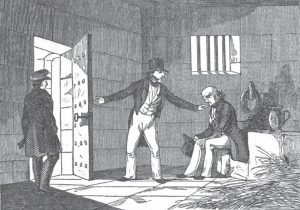
 Col. Richard Mentor Johnson freeing a man from debtors’ prison (public domain)
Col. Richard Mentor Johnson freeing a man from debtors’ prison (public domain)Sunday’s Gospel from the Revised Common Lectionary (Matthew 18:21-35) continues the same scene as last week, and leaves us with a remarkable, simple, working definition of forgiveness.
If you are a regular reader of these weekly meditations, you know that I often point out places where historically we Christians have misconstrued the teachings of the four Gospels. This time I’m making a different argument: We just haven’t mined this text for all its rich goodies.
Matthew 18:21-35
The text breaks down into two parts
Peter’s question: How many times must I forgive?
Jesus’ answer in a parable, with a working definition of forgiveness.
Forgive Early and Often
Most people get stuck on the first part of the text. Peter asks Jesus how often he has to forgive his brother.
…how often should I forgive?
As many as seven times?
Matthew 18:21 NRSV
Of course the NRSV broadens the possibilities for the alleged offender in a modern way, converting the “brother” of the Greek to “another member of the church.”
I, however, like to think Peter said “brother” because he was grumpy over Andrew’s constant shenanigans.
Peter shows he wanted a pretty low limit — especially if he was thinking about Andrew. Can you imagine two brothers reaching adulthood only having to forgive seven times?
That’s a good afternoon’s work at my house.
Anyway, Jesus ups the ante. He takes Peter’s seven and says he must actually forgive eleven times that often — or seventy times as often, depending on which translation you read.
That seems to be where many readers get stuck. But debating between forgiving 77 times and 490 times is absurd. It is as if we think Jesus actually was trying to set a hard limit on forgiveness.
My personal paraphrase?
Seven is just getting started Pete. You need to keep forgiving till you lose count.
So I guess forgiveness is like voting in a corrupt democracy: do it early, and often. (Like by mail, and then in person?)
This makes me think of issues just a step further down the road:
Are there differences between “forgiveness,” and “reconciliation,” and “healing,” and a “restored relationship”?
Is there a good working definition of forgiveness?
On these, the parable helps us out, implicitly and explicitly.
The Math
The parable is actually a comic story. It’s hard to see the humor without doing a bit of math — plus we typically read Jesus’ words in pious somber tones. This one calls for broader, exaggerated drama.
First the math:
The king’s servant owed, Jesus said, 10,000 Talents. That sounds like maybe a big number. But how big? Are we talking $10,000? That’s a big debt.
No my friend. Think bigger.
Let’s do the math and see what the debt would look like today in the US.
I’m not doing major research here. The footnotes to my NRSV tell me that a “Denarius” was a day’s wage for a laborer, and a “Talent” was more than fifteen year’s wages.
Okay, let’s figure it out.
U.S. Minimum wage
The U.S. minimum wage is currently $7.25/hour
1 Day’s wage (aka, a “Denarius”)
A day’s work at minimum wage: $7.25 X 8 hours = $58
1 Year’s wages
If a laborer in Jesus’ culture worked 6 days a week, there would be about 313 working days per year (365 days – 52 sabbaths).
One year’s wage: $58 (1 Denarius) X 313 (working days) = $18,154.
(I’ll skip the fact that this is grim commentary on life working for the American minimum wage.)
1 Talent:
So a Talent, is 15 years’ wages: 15 X $18,154 = $272,310
That already puts my little guess of $10,000 to shame, but we aren’t there yet.
10,000 Talents
To get the size of the first slave’s debt, we multiply 10,000 by a Talent: 10,000 X $272,310 = $2,723,100,000
That’s nearly $3 Billion.
What about the other slave’s debt?
He owed 100 Denarii or 100 day’s wages: 100 X $58 = $5,800
A whole lot of people carry more on one credit card.
Revisiting the Story
So let’s slip those numbers into the text and see if the broad comedy emerges
…the kingdom of heaven may be compared to
a king who wished to settle accounts with his slaves.
When he began the reckoning,
one who owed him $2,723,100,000 was brought to him;
and, as he could not pay, …
Well of course he couldn’t pay! This guy’s slave owed more than the whole net worth of anyone but the 743 richest people on earth.
…his lord ordered him to be sold,
together with his wife
and children
and all his possessions,
and payment to be made.
Matthew 18:23-25 adapted from NRSV
Now that sounds really awful. Draconian. But it’s kind of like “Chapter 11” bankruptcy. Freeze the assets, and sell stuff off to cover what debts can be covered. The bummer is that this is a case of chattel slavery. The king is going to sell the man and his family. (And anyone who knows American history, knows that we have had far too many stories of enslaved people sold and separated from their families.)
And what happens? The guy figures he needs to cover what he can of those debts.
His quickest source of capital? Call in the debts he’s made to other people. “
But that same slave,
as he went out, came upon one of his fellow slaves
who owed him $5,800; …
Matthew 18:28 NRSV adapted from NRSV
You, O reader, think “What’s six grand in comparison to three billion dollars? I have more than that on my Amex!”
A Case of Melodrama
Well, to the second slave it was a lot. But to the first slave, this was his chance for double satisfaction:
First, he could winnow down his big debt. Not much, but some.
Second, he could take out his aggression on someone weaker. You know: like a bully.
…and seizing him by the throat, he said,
‘Pay what you owe.’
Matthew 18:28 NRSV
So okay, it’s not comedy. It’s melodrama. But the math makes all the difference.
The one guy owes more than the GDP of any one of 28 whole countries.
The other guy owes less than a set of living room furniture (one couch that came up on my Google search was $7,700).
A Working Definition of Forgiveness
All that melodrama is there to frame what I believe is the most important point in the passage: Jesus’ working definition of forgiveness.;
When the king confronted the guy who owed him slightly less than the GDP of Belize,
…the slave fell on his knees before him, saying,
‘Have patience with me, and I will pay you everything.’
And out of pity for him,
the lord of that slave released him
and forgave him the debt.
Matthew 18:26-26 NRSV
So what is the definition of forgiveness in this passage?
Forgiveness is not collecting what is owed.
Forgiveness is not punishing someone, even though they deserve it.
I have long found this to be incredibly helpful on a practical level.
We often assume that “forgiving” someone means that everything is healed and we have a clean fresh start.
In this story, not everything was healed. The king took a loss more than twice the GDP of Grenada. That’s gotta hurt.
And in this story, there wasn’t quite a clean start for the guy who was forgiven. He was watched. When he didn’t forgive the relatively tiny debt of his fellow slave, his own forgiveness was basically reversed.
Forgiveness was, in a clear sense, conditional. Jesus expected him to learn from the experience.
It wasn’t enough to stop taking on excessive debt.
Jesus expected the guy to learn to be like his king.
The king forgave the slave. The slave was supposed to forgive others.
A Sober Threat
But the slave refused to forgive his fellow slave. That led to dire consequences.
…in anger his lord handed him over to be tortured
until he would pay his entire debt.
Jesus has a clear expectation. He forgives us, and must learn to forgive — or else. It is actually pretty threatening:
So my heavenly Father will also do to every one of you,
if you do not forgive your brother or sister
from your heart.
Matthew 18:34-35
It sounds harsh. But then it is precisely the deal each of us makes with God when we pray the prayer Christ taught his disciples. You know: the Lord’s Prayer.
And forgive us our debts,
as we also have forgiven our debtors.
Matthew 6:12 NRSV
And he accompanies it with a sober threat there as well:
For if you forgive others their trespasses,
your heavenly Father will also forgive you;
but if you do not forgive others,
neither will your Father forgive your trespasses.
Matthew 6:14-15 NRSV
Wow. This discipleship thing sounds really serious.
++++++++++++
Would you do me a favor? Click on one of the sharing buttons below so your friends on Facebook, Twitter, LinkedIn, or Pinterest can enjoy this meditation. Thanks!
The post A Definition of Forgiveness — Matthew 18:21-35 appeared first on Gary Neal Hansen.
September 4, 2020
Church Discipline — A Meditation on Matthew 18:15-20
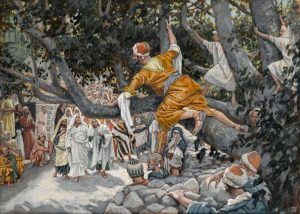
 Zacchaeus in the Sycamore Awaiting the Passage of Jesus, James Tissot (public domain)
Zacchaeus in the Sycamore Awaiting the Passage of Jesus, James Tissot (public domain)This Sunday the Gospel text is Matthew 18:15-20, a classic text in discussions of church discipline, and the first of two weeks the Revised Common Lectionary will spend in Matthew 18.
Though I seem constitutionally incapable of writing a genuinely short meditation, I’ll try to confine myself to a few observations on this text, especially in light of the ways it contrasts with common interpretations of it.
Matthew 18:15-20 and Church Discipline
This text gets talked about a lot when Christians consider church discipline. Sometimes that’s a formal affair, as in the Reformed Tradition where church discipline has a long and prominent history.
But also, the text comes up in the less formal conversations of independent evangelicals. Their the denominations may provide no formal procedures of church discipline, but Christians still find themselves feeling the need to deal with each other’s perceived misbehaviors.
And then someone suggests that they follow “the Matthew 18 process.”
The “Matthew 18 Process”
This is the one text where Jesus seems to lay out a very specific process for church discipline. And it does seem straightforward:
1. You spot the sin.
2. You talk to the offender.
2a. The sinner repents. Happy ending. Or…
2b. The sinner refuses. Go to step 3.
3. Take two or three witnesses and confront the sinner again.
3a. The sinner repents. Happy ending. Or…
3b. The sinner still refuses. Go to step 4.
4. Haul the belligerent sinner in front of the whole church for a public confrontation.
4a. The sinner repents. Happy ending. Or…
4b. The sinner still refuses. Go to step 5.
5. Exercise Discipline, i.e.,
5a. Cast the sinner into the outer darkness, where there is weeping and gnashing of teeth, or …
5b. At least shun the rotten miscreant.
I would like to suggest that the above, though tidy, actually misconstrues Jesus’ instruction.
“Against you”
Notice in particular how the passage begins:
If another member of the church sins against you…
Matthew 18:15 NRSV
This translation says “another member of the church, but of course the Greek said “your brother.” The NRSV is being a bit more broad minded, assuming that the offender might also be a sister. They avoid other cumbersome possibilities and interpret Jesus as speaking of any member of the Christian family.
More importantly, notice that the NRSV, along with the KJV, the Message, and numerous other translations, says this is about when someone sins “against YOU.”
Not all translations include this phrase (see the NIV and NASB for instance). That’s because not all the Greek Manuscripts include the phrase. There is a textual variant.
Translators have to decide which variants are most likely to reflect the original text. Clearly there is a difference of opinion on this one.
However, just for today let’s take the view of the KJV, the NRSV, and the Message. Jesus, it seems, is not talking about anyone caught sinning in any way at any time. He’s telling you what you can do when you have been personally harmed.
In passing I’ll mention that the 1599 Geneva Bible included the “against thee” (with the footnote “If his offence be such, that thou only knowest thy brother’s offence.”)
Still, a couple generations earlier, in Calvin’s time, the expectation was clear that neighbors were expected to be on the lookout for neighbors who sinned, and turn them in to the church elders. (That’s part of why Reformed church discipline isn’t remembered all that fondly.)
I’d favor confining Jesus’ instruction here to cases where we’ve been harmed personally. He encourages us to take courage, speak up, and confront the one who has harmed us.
Two further notes:
First, obviously there are cases where the offense is extreme and personal confrontation would put the victim in danger. One has to use discretion. Sometime the offense is better reported to the police — and doing so doesn’t make the victim a bad Christian.
Second, and on a totally different topic, notice please that Jesus refers to people “sinning” against each other. Remember the modern translation of the Lord’s Prayer saying “forgive us our sins, as we forgive those who sin against us.” I can’t tell you how often I’ve heard people object to this, saying that sin is only something we do against God, not something we do against each other. Jesus clearly disagrees.
“A Gentile and a tax collector”
There is, I have long believed, a deep misunderstanding about the end point of this process. I said, tongue in cheek, that if the accused sinner doesn’t repent, he or she is to be cast into the outer darkness with all the related weeping and gnashing of teeth.
Jesus did, from time to time, use those words, especially at the end of a parable. But, in Matthew 18:15-20, that is not what he says should happen at the unsuccessful conclusion of a case of church discipline.
Here’s the actual text:
…and if the offender refuses to listen even to the church,
let such a one be to you as a Gentile and a tax collector.
Matthew 18:17 NRSV
Historically Christian communities have leaned toward the “cast into the outer darkness” conclusion.
In Geneva if not being allowed to receive the Lord’s Supper was not sufficient to bring repentance, sometimes the sinner had to leave town.
Anabaptists were famous for a kind of shunning known as the “ban.”
But really, since this is Jesus saying to treat someone like “a Gentile and a tax collector,” we ought to stop and ponder how Jesus himself treated Gentiles and tax collectors.
Jesus welcomed and cared for Gentiles.
Jesus welcomed tax collectors, eating at their homes — like Zacchaeus in the image at the top of this post. (Sometimes he made them apostles.)
So what is Jesus saying we should do to people who won’t repent, even when publicly confronted about their offenses?
He is saying we should love them. We should welcome them and bless them.
The process makes clear that they are not living by the standards of the community. Here, in Jesus’ ministry, as “Gentiles” they would be acknowledged to be “not Jews” or “not Israel.”
But they are not to be condemned, or otherwise cast into the outer darkness.
Temptations of Power
Jesus says a couple other things here that we tend to take in troubling directions. He goes on to reiterate to all the promise made to Peter after his confession:
…whatever you bind on earth
will be bound in heaven,
and whatever you loose on earth
will be loosed in heaven.
Matthew 18:18 NRSV
And then he concludes (for this week’s reading, at least) with a promise we frequently relate to prayer:
…if two of you agree on earth
about anything you ask,
it will be done for you by my Father in heaven.
Matthew 18:19 NRSV
These statements pique our curiosity because they seem to promise so much. They seem to put so much power into our hands.
If only we could figure out what it means to bind and loose stuff, maybe we could get direct action in heaven.
If only we could find a technique to fully and perfectly agree about what we are asking for, maybe we could guarantee our prayers got answered.
Personally, I think that these are among Jesus’ odder sayings. They seemed important to him — he repeated them in a number of contexts. But it has never really been clear what we should make of them in daily Christian living.
And I will say, those who try to read them as personal universal promises find themselves both overwrought and in a bad place spiritually. We human beings don’t deal well with power. We are in trouble when we try to make the Christian life about having power, using God’s power for our own purposes.
If we think Jesus was making a deal which obliged almighty God to do our will, we pretty much have the whole ballgame backwards.
“I am there”
Better to focus on the wonderful, and eminently clear, promise at the end.
For where two or three are gathered in my name,
I am there among them.
Matthew 18:20 NRSV
That’s what we need in the life of faith: We need the presence of Jesus.
That’s what we need from community as well: We need to know that when we draw close to each other because we belong to him, Jesus is really there.
Not that the presence of Jesus solves all the problems.
People still sin against us.
We still need to be brave and confront each other about the harm we’ve endured.
People who get confronted for their sins still, often, don’t repent. (Read the news. There’s a lot about this one going on right now.)
But we still need to gather in his name. We still need to seek his presence. We need to keep forgiving, keep following, keep loving, keep serving.
What power we get in the Christian life needs to be used, together, to love our neighbors.
++++++++++++
Would you do me a favor? Click on one of the sharing buttons below so your friends on Facebook, Twitter, LinkedIn, or Pinterest can enjoy this meditation. Thanks!
The post Church Discipline — A Meditation on Matthew 18:15-20 appeared first on Gary Neal Hansen.
August 28, 2020
Get Behind Me and Take Up Your Cross
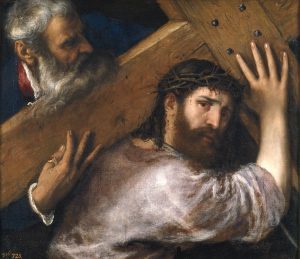
 Titian, Christ Carrying the Cross (public domain)
Titian, Christ Carrying the Cross (public domain)A Monday Meditation on Matthew 16:21-28 — Year A, Proper 17(22)
On the 13th Sunday after Pentecost, the Gospel reading in the Revised Common Lectionary is Matthew 16:21-28, where Jesus meekly says to Peter, “Get behind me, Satan!” That is, we pick up where we left off last week.
The pause between last week’s part and this week’s can be a bit deceiving. Jesus rewarded Simon’ confession of faith with a new name (Cephas, or Peter, the rock), plus the mysterious promise of the “keys.” That can seem to lend credence to the superiority of Peter among all the Apostles.
But then we get this week’s reading. Here, after just a bit more conversation, Jesus says Peter is the devil.
So much for his big promotion.
Matthew 16:21-28
This week’s reading, however, is a huge turning point in the Gospel of Matthew.
Up to last week, Jesus’ ministry, with all his miracles and his teaching, was aimed toward getting the disciples exactly where Peter was: seeing that Jesus really is the Messiah.
From this week onward, he redirects them to the coming of his passion. They are now expected to know he is the Messiah. They aren’t supposed to tell other people, but they know, and with that knowledge in place they are to learn the next necessary lesson: the Messiah saves through his willing self-sacrifice, going even to death so that he can win the victory over death.
There are three sections here:
Jesus begins to fortell the passion.
Peter rebukes Jesus, who replies “Get behind me!”
Jesus waxes a bit apocalyptic.
Peter Rebukes Jesus, who replies “Get Behind Me!”
Just now I’m most drawn to #2.
Preachers tend to get on Peter’s case. Peter has the audacity to rebuke Jesus, and Jesus smacks him down, saying “Get behind me, Satan!”
But think about Peter’s confidence here. Where did it come from? Peter was so assured his relationship with Jesus that he could actually speak up and contradict his Lord.
Um, Jesus, this passion and cross idea—I don’t think so. Maybe we should run a focus group before you commit.
That’s pretty great, really.
What About Our Talks with Jesus?
What would happen if we, like Peter, had no fear in prayer? What if you were to speak out exactly what you think and feel, even if it means telling God he’s doing the wrong thing?
Worst case scenario? Maybe God tells us we are wronger than he is.
Big deal. At least we have an honest relationship.
So God goes ahead and does what he wants to do. No problem.
At least we showed up in our faith. At least we lived truly before God.
And if it seems like God is about to allow something really awful? At least if we speak up the blame is not on us.
Jesus Begins to Fortell the Passion
Which brings us back to #1 on the list: the first passion prediction. It’s a huge turning point.
As Matthew puts it,
From that time on,
Jesus began to show his disciples that he must go to Jerusalem
and undergo great suffering
at the hands of the elders and chief priests and scribes,
and be killed,
and on the third day be raised.
Matthew 16:21 NRSV
We hear it with no surprise. We’ve been through the church year a few times. We know that Holy week is coming, with betrayal, trial, torture, and death.
If we have a bit of theological perspective, we also know that these horrifying events are necessary if we want to see the glory, and experience the new life, of resurrection at Easter.
Their Big Hope — Dashed
But try to imagine this scene as if you were there among the twelve. They had spent 15 chapters walking alongside Jesus, seeing the wonders, hearing his wisdom and his wit, knowing the power of his grace.
They heard him fulfill what Isaiah said of the Messiah. Peter, at least, put two and two together and proclaimed his faith. The rest surely agreed.
It was all going so well.
Surely, if you were in that group of early followers, you had a sense that with Jesus the kingdom, the messianic age, was now unfolding. Life was finally beginning to be what God intended from the beginning and promised in the covenant and the prophets.
So with that opening of hope in your heart, how would you feel about Jesus saying he’s going to be betrayed, and tried, and tortured and killed?
Let’s all admit it: we would be right there with Peter, telling Jesus not to go there.
Our Little Hopes — Dashed
And doesn’t it happen in our lives, at least now and again, that we start to think that Jesus is bringing everything around to be the way we think it should be?
Finally we are loved instead of alone.
Finally we have a sense of calling rather than an empty drudge of a slog to payday.
Finally we are getting some respect, a place in the world…
And then it comes smashing down. With or without a pandemic, we can lose a job or a loved one, our health or the respect of those around us.
Well, are we supposed to just wallow in despair?
No. We should speak up, like Peter did.
Hey Lord, this just shouldn’t be. You are the Messiah – you’re supposed to work stuff out. You were bringing us the kingdom. You shouldn’t let it turn all rotten. What up?
That’s prayer in the confidence of faith. That’s carrying on a conversation with the Lord who genuinely loves you.
But when we do speak up, when we really open up that conversation, we have to be open to Jesus maybe telling us that we are wrong.
We don’t have all the facts. We don’t really understand what he’s up to.
Thanks for your input,” he says, “but please get behind me.”
Jesus Waxes a Bit Apocalyptic
Which brings us to #3: the more apocalyptic bits.
To Follow, You Have to Get Behind Me.
It all starts with getting behind Jesus.
Jesus is on his way to Jerusalem, getting in line to pick up his cross. He knows, and they all should know, what the image means. The purpose of carrying a cross is to go to your death.
Jesus says for Peter “Get behind me!” In other words, “follow.” That’s what he says to us as well.
Come and get your own cross. Go with him, his way, which is the way of death.
And paradoxically, it is the way to life. If you run away to keep your life safe (that is, if you hold on to fake Jesus who promises you peace and prosperity and all your dreams come true) then you will lose your life. You’ll squander it, ending up with nothing.
But if you follow him, step behind him and go get your cross, it turns out differently.
Accept the fact that you too are here not to be served (by God or anybody else) but to serve (God and your neighbor). Then you’ll get your life back. For keeps.
The More Apocalyptic Bits
The passage ends with a prediction that “the Son of Man” will eventually come with angels in God’s own glory for judgment. He then seems to contradict himself (or to get subsequent history wrong) saying some of those alive will live to see the coming of “the Son of Man” in his kingdom.
Three brief thoughts:
1. This is the return to the initial question from last week’s reading. He’s still trying to get them to make the connection between the OT apocalyptic “Son of Man” and himself, Jesus, the acknowledged messiah.
2. What sounds like a threat, about how the Son of Man will “repay everyone for what has been done,” (Matthew 16:27 NRSV) may also be a promise. At the very least it is a prompt to remember to strive to live doing what Jesus himself did and taught.
3. Perhaps there is a difference between the coming in glory of verse 27 and the “coming in his kingdom” of verse 28. Those apostles did indeed see a rapid unfolding of the kingdom, the reign of Christ, in the events recorded in Acts. Either that or… well… Jesus kind of got it wrong I guess.
++++++++++++
Would you do me a favor? Click on one of the sharing buttons below so your friends on Facebook, Twitter, LinkedIn, or Pinterest can enjoy this meditation. Thanks!
The post Get Behind Me and Take Up Your Cross appeared first on Gary Neal Hansen.
August 20, 2020
Matthew 16:13-20 — The Rock, the Keys, and the Gates of Hell
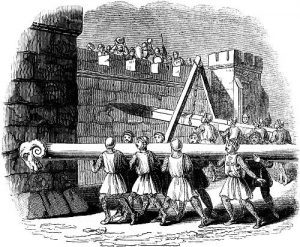
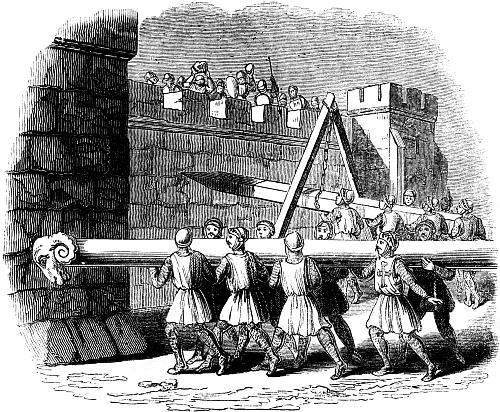 Attack on the walls of a besieged town (public domain)
Attack on the walls of a besieged town (public domain)Matthew 16:13-20 is Sunday’s lectionary Gospel. I set out to make just a few brief observations. It has been one of those pandemic weeks when I found myself simply running on empty. I suspect you know the feeling.
I’ll pray for you, and hope you’ll do the same for me.
In the end, because the text always does this to me, I seem to have written a rather long meditation.
Matthew 16:13-20
On the 12th Sunday after Pentecost we jump into the middle of Matthew 16, skipping the stories that put this brief conversation between Jesus and the disciples in context. We’ll just have to remind ourselves.
Jesus had an argument with the Pharisees who asked for a sign. (He turned them down.)
When they left, Jesus warned his disciples about “the yeast of the Pharisees.”
His disciples got worried because they forgot to bring any bread to eat.
Jesus did a verbal face palm, because “yeast” was a metaphor, and they knew he could feed thousands by miracle.
1. Questions of Identity
The first part of Matthew 16:13-20 is a very familiar pair of questions — which I think I’ve always previously misread.
The questions in my memory
In my memory Matthew 16:13-20 goes like this:
Question 1: Jesus first asks who the people say that he is
Answer 1: Some biblical prophet risen from the dead.
Question 2: Jesus asks who the disciples think he is.
Answer 2: The Messiah.
Message: The crowd hadn’t realized yet who Jesus was, but Peter, for one, got it right.
First of all, the idea that the people in general thought Jesus was Elijah or Jeremiah back from the dead is… well let’s say it’s odd. Probably unlikely.
Today I notice that something else is going on here.
The questions in the text
Here’s question 1 from the text:
Who do people say that
the Son of Man is?
Matthew 16:13 NRSV
My recollection was right about the first part of the question: Jesus is asking about the general public opinion.
There is something else going on in the second part, though. He asks who people think “the Son of Man” is.
That’s a term Jesus borrowed from prophetic and apocalyptic texts. In over a dozen Old Testament contexts the “son of man” is a mysterious, symbolic identification. It’s part of complicated pictures of God bringing salvation to Israel and the world.
Jesus refers to “the Son of Man” some 30 times in Matthew. You and I read those passages and we think “He’s talking about himself.” But look up those 30 references and try to imagine what people at the time were hearing. It isn’t so clear.
Sometimes it seems to be about himself — but even then it is really weird, since he would be talking about himself in the third person, almost as if talking about someone else.
Sometimes it seems more like he’s referring back to the OT apocalyptic and prophetic texts, saying something about how they will (someday? now?) be fulfilled.
The Son of Man?
With that ambiguity in mind, Matthew 16:13-20 sounds more like Jesus is fishing for something. Sort of like,
Who do people say that the Son of Man is? You know, that strange figure in the prophets? Are people talking about apocalyptic figures at all around here?
Here’s their wrong answer:
The Son of Man might be one of the prophets? Maybe Elijah or Jeremiah risen from the dead?
Here’s the answer Jesus hoped for:
YOU Jesus! People think YOU are the Son of Man!
Conclusion: The crowd has not yet figured out that Jesus’ convoluted references to the Son of Man refer to himself.
Jesus?
Contrast question 2:
But who do you
say that I am?
Matthew 16:15 NRSV
Okay, he says, forget about the crowd. Let’s come at it from the opposite direction.
Jesus wants to know whether his disciples are tracking with his message and his work. Are they figuring out who he is?
Expected okay answer: “We think you are the Son of Man.” That would have gotten an “A” in disciple school.
Peter’s even better answer:
You are the Messiah,
the Son of the living God.”
Matthew 16:16 NRSV
Go to the head of the class, Peter. A+.
I think that reading the conversation this way is something worth spending some time on. Jesus is wondering whether anyone out there is taking in the biblical use of the name “Son of Man” and comparing his words and deeds and coming to the right conclusion.
Who does anyone say the “Son of Man” is? Is anybody out there getting it right?
2. The Rock
Jesus is over the moon about Peter’s answer. This guy Cephas has hit the nail on the head. His faith is hard as a rock. So let’s call Cephas, son of Jonah, “Peter,” i.e. “The Rock.”
If he were Norwegian, he’d have gone down through history as Rocky Jonasson. (That’s “Johnson” in John’s Gospel.)
His response has led to three rather wild misinterpretations of the various parts of Matthew 16:13-20.
First, is a misinterpretation of Jesus’ riff on the idea of Peter and his rock hard faith.
…and on this rock
I will build my church…
Matthew 16:18
The Pope?
In the West, until the Reformation, (and still in the Roman Catholic Church,) this came to be understood as Jesus building the Church on Peter personally as the leader among the apostles, and in his office and the first bishop of the capital city of the empire, Rome.
From this came the idea that the successive bishops of Rome, eventually designated (like other major bishops back in the day) as “Popes”, were forever the heirs of Peter’s authority as the rock on which the Church was built.
I’m not going to convince anybody who believes that this is the case. Still, it does not seem the most likely interpretation.
I think the Reformers of the 16th century were on a better line of thinking when they took it to be a reference not to Peter’s personal authority, but to his faith. On such faith the Church is indeed built.
Reformation polemics aside, there is an important word here for the 21st century Protestants and post-Protestants who think that the whole idea of the Church is a human creation, a relic better left behind.
Thousands, it seems, of what we used to call congregations of the Church now want to think of themselves as simply worshipping communities. Some have more ties to larger Church bodies, and some have really none at all. But claiming to be part of the Church is far from the fashion.
Here, in this conversation, Jesus lets us know that his intention was, in fact, to build the Church. We dare not leave it behind. We must, however, strive with all our might to make it faithful to his call and vision.
3. The Keys
The second notable misinterpretation has to do with the “keys.” It is mostly a relic of the past, and an outgrowth of the first. Jesus says Peter gets
…the keys of the kingdom of heaven…”
Matthew 16:19 NRSV
This comes with the authority to “bind” and “loose” things on earth and in heaven.
Personally, I read this alongside the other verses where we are told that sins we forgive are forgiven in heaven, and vice versa.
Treasury of merits
In the Middle Ages, however, the Church came to the rather extended conclusion that Peter, and his successor bishops of Rome, were the personal holders of the keys of “the treasury of merits.” This was a spiritual stockpile of all the good that Jesus and the saints had done beyond what was needed for their own salvation.
The Popes could unlock this treasure chest, and make use of it to help others on the journey to salvation.
Indulgences
Thus the idea of “indulgences” about which Luther had 95 important things to say.
If you committed sins, the eternal penalty was forgiven by Christ when you confessed, but there was also a “temporal” or earthly penalty to be paid. If you died before it was paid, you went to purgatory till your account was cleared.
So… If you had not done enough acts of virtue to deal with the earthly penalty for your sins, then the Pope could, by the power of the keys, make a withdrawal — an indulgence — from the treasury of merits, and pay your bill.
Out of purgatory you would go, straight to heaven.
Whew!
4. The Gates of Hades
I’ll close with what I think of as a very common, but rather subtler, modern Protestant misinterpretation of Matthew 16:13-20.
Jesus said the Church would be built on Peter and his rock hard faith,
and the gates of Hades will not prevail against it.”
Matthew 16:18 NRSV
I may be wrong about this, but when people talk about this verse it always sounds like they think that the “rock” here is a defensive structure, keeping believers safe and secure against the assaults of the devil and his minions.
But that is not how the metaphor works.
If the rock of faith keeps us from the assaults of hell, this verse gives us the picture of a bunch of gates zooming up from hell to whack us over the head.
No no no.
This is a statement about the Church in mission.
We, with faith like a rock, are supposed to be storming hell, seeking to bring out all who are held in torment by the devil’s chains.
We’re supposed be like the soldiers with the battering ram in the picture at top, trying to rescue those oppressed by sin and its servants.
We are supposed to be smashing the gates of hell, knocking them down.
And Jesus says that the gates of hell are nowhere near strong enough to stop us.
But, alas, we do not really want to storm the gates of hell. We want the Church to give us comfortable middle class lives, ideally behind the iron bars of a modern gated community.
++++++++++++
Would you do me a favor? Click on one of the sharing buttons below so your friends on Facebook, Twitter, LinkedIn, or Pinterest can enjoy this meditation. Thanks!
The post Matthew 16:13-20 — The Rock, the Keys, and the Gates of Hell appeared first on Gary Neal Hansen.
August 7, 2020
A Children’s Sermon on Matthew 14:22-33

 Winslow Homer, Girl Seated on Hillside Overlooking the Water (public domain)
Winslow Homer, Girl Seated on Hillside Overlooking the Water (public domain)There are at least three options when creating a children’s sermon on Matthew 14:22-33.
There is the story of Jesus walking on the water.
There is the story of Peter trying to walk on the water too.
But there is also the story before anybody thinks about walking on water: the story of Jesus seeking some time alone for prayer.
When I saw the text I thought I’d be writing about walking on water. I’ve had great fun with that as a bedtime story for my kids. I’ll do it as a children’s sermon sometime.
But right now, in the midst of a pandemic, with so many kids cooped up with their families, the other side of this text seems like it might reach some kids in a particularly helpful way.
As always, you can feel free to use this, either as a children’s sermon in your worship service, or as a bedtime story for your kids. But please, do me the kindness of letting me know how it goes, either by email or below in the blog comments section. I’d love to know what works, what doesn’t, how you adapted it, and how kids responded.
A Children’s Sermon on Matthew 14:22-23
I wonder if you’ve ever had a really hard day.
Sometimes Jesus had hard days.
One day, Jesus had been working very hard. He was tired and he wanted some rest.
As well as being tired, he was sad: he had just learned that his cousin John the Baptist had died.
So Jesus told his friends, “I’m going to find someplace quiet where I can be alone for a while.”
And off he went.
Pretty soon, though, people found out where he was. They came from miles around, bringing sick people. They asked Jesus to heal them.
And of course Jesus did heal them. He loved to help people.
But then they were hungry. Jesus’ disciples brought him all they had: Five loaves of bread and two fish. They needed Jesus to help make that tiny amount of food enough for a huge crowd of people.
And of course Jesus did feed them. He loved to help people.
But as soon as they were all done eating, Jesus saw his opportunity. He said to his disciples, “Hey you guys, get in the boat and sail across the Sea of Galilee. I’ll meet you on the other side.”
Thomas spoke up: “Lord, we’ll go, but how are you going to find us? Should we just wait for you there?”
Jesus walked them toward the boat to get them moving. Then he said, “Never mind that, Thomas. I’ll find you alright. Just go.”
When his disciples finally sailed away, Jesus said to the crowd, “Okay everybody, that’s it for tonight! It’s time to head back to your homes. I’ll see you another time!”
And then, Jesus headed up the hill, way out of sight of the crowd.
“Finally!” he said to himself. “I’ve wanted some time alone for such a long time!”
He sat down under a tree. He looked out over the Sea of Galilee. He took some deep relaxing breaths. He let himself enjoy the good feeling of being alone.
Then, the Bible tells us that he spent some time doing something very important: He spent his alone time praying.
I suspect he spent some time telling God how tired he was from all he had been doing.
Maybe he spent some time telling God how sad he was that his cousin John had died.
He probably spent some time thanking God for helping him heal and feed all those people.
I bet he spent some time asking God to help him do all the work that lay ahead of him.
Wondering…
I wonder if you’ve ever taken some time to be by yourself?
I wonder if you’ve ever felt tired from working too hard and wanted some rest?
I wonder if you’ve ever felt like too many people are too close, making too many demands?
I wonder what you might talk to God about if you went to your room or your yard or a park to be alone and pray?
++++++++++++
If you like this children’s sermon, please do me a favor and share it, using the social media buttons below!
The post A Children’s Sermon on Matthew 14:22-33 appeared first on Gary Neal Hansen.
August 6, 2020
Walking on Water — Matthew 14:22-33
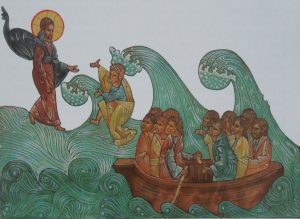
 CC by Ted-SA 2.0
CC by Ted-SA 2.0The lectionary Gospel for the 10th Sunday after Pentecost in Year A (Matthew 14:22-33) picks up right where the previous week’s text left off. It is a text with several fascinating moments, each worth some meditation, concluding with the seriously fascinating story of Peter walking on the water.
Last week, Jesus had taken off for a bit of solitude, but a huge crowd found him — 5000 men, plus women and children. Jesus healed their ills, then miraculously fed them with five loaves and two fish.
Matthew 14:22-33
This week, Jesus returns to his previous goal: He’s aching for some solitude. So Jesus sends his disciples off by boat, sends the crowd home with their tummies full of bread and fish, and hikes up the mountain for some time in prayer.
Solitude
This initial movement of the story is worth noting, even if it is rather obvious: Jesus puts a high priority on both solitude and on prayer.
People in ministry, despite being accused by the ignorant of working only on Sunday, tend to be obsessive about their working lives. Partly because there is rather little structure, and partly because the work is never actually done, we tend to fill the days and hours with what we see as necessary working tasks.
(Many of us also do this because we are rather weak emotionally. We fear that members of the congregation will think we are slacking if we aren’t busy, busy, busy.)
So Jesus’ choices here are significant for us all, but especially for those in ministry.
Jesus actively chose to turn aside from ministry from time to time, and pursue time alone. Even when his plan for solitude was thwarted by ministry, he didn’t give it up. He came back to it, and pursued solitude again.
I say he “actively” chose solitude, because you can see in the text that he made specific choices to bring it about.
…he withdrew from there
in a boat
to a deserted place
by himself.”
Matthew 14:13 NRSV
Then, after being swarmed by a crowd, and being consumed by his call to heal and feed them, he took a careful series of actions.
First he got rid of the disciples:
Immediately
he made the disciples get into the boat
and go on ahead
to the other side…
Second he got rid of the crowd:
…while he dismissed the crowds.
Third, he high-tailed it to someplace nobody could find him:
And after he had dismissed the crowds,
he went up the mountain
by himself…
Matthew 14:22-23 NRSV
So please, my friend, you know you need some time alone. Don’t give up just because of the nagging needs of those around you, or because being cooped up in a pandemic emphasizes those needs.
Do like Jesus: Keep seeking times of solitude. Take a walk around the block. Go in your room and close the door.
So you got interrupted? Try again. A few minutes here. A few minutes there. You need it.
Prayer
Notice, also, what Jesus did with his solitude: He prayed.
“…he went up the mountain by himself
to pray.”
Matthew 14:23 NRSV
It doesn’t say exactly what he prayed, or how he prayed. (He was alone, after all.)
Matthew just tells us that he prayed.
So please, for the health of your soul, take some of your hard-fought solitude time and do what Jesus did: pray.
(If you want ideas of how to go about that, check out my book Kneeling with Giants. You’ll surely find a way or two that feeds your spiritual life.)
Evening
Jesus prayed and prayed. Time passed. Then, Matthew says,
When evening came…
Matthew 14:23 NRSV
The funny thing about this is that in the text it was already evening.
Back after Jesus healed all the sick people in the crowd of 5000+,
When it was evening,
the disciples came to him and said,
“This is a deserted place,
and the hour is now late;
send the crowds away
so that they may go into the villages
and buy food for themselves.”
Matthew 14:15 NRSV
So I suspect one of two things is happening.
1. Perhaps dinner was when it was just barely evening, but now it was really really evening, like the dead of night.
2. Or maybe we have another example of Matthew being far less attentive to the details than Mark was when telling the same story.
Walking on Water (1)
When Jesus as done praying, his friends were, of course, far away. They’d been sailing toward the far shore of the Sea of Galilee for a good long while.
Who knows how they thought Jesus was going to catch up with them when he insisted that they leave him behind.
But Jesus knew how he would get there.
Just as you learned in geometry, Jesus knew the shortest distance between two points was a straight line. So Jesus just took off walking straight toward his friends. Across the water.
And his friends totally freaked.
It’s an understated miracle, less expected than his healings and less dramatic than feeding a crowd. It’s also one of Scripture’s quietly funny moments.
Understated and funny as it may be, it makes an important theological point: Jesus is master of all creation. Just as he can heal with a touch or a word, and can multiply bread by breaking into smaller pieces, he’s not limited by ordinary laws like gravity.
But they don’t understand. They think Jesus is a ghost. Maybe they were find thinking of Jesus as the Messiah. Could they imagine he was really God? With all God’s abiliities?
This scene portrays what Paul described in Colossians as Jesus’ nature and role:
He is the image of the invisible God, the firstborn of all creation;
for in him all things in heaven and on earth were created,
things visible and invisible,
whether thrones or dominions or rulers or powers—
all things have been created through him and for him.
He himself is before all things,
and in him all things hold together.
Colossians 1:15-17 NRSV
Christ is the God who made all of creation. Christ keeps it, moment by moment, from collapsing into nothing. He is above any creaturely limitations. Of course he can walk on water.
They saw Jesus walking on water. They welcomed him into the boat. The storm calmed down. All of that was what prompted their worship and confession of faith at the end of the scene.
Walking on Water (2)
Meanwhile, though, we get the grabber: Peter calls out to Jesus. Jesus tells Peter to come to him. There he goes! Peter is walking on water too — but then he sinks.
Peter’s courage is not the main point here. Yes, to walk on water we must get out of the boat. But this passage doesn’t really call all of us to walk on water. The passage focuses on what made Peter sink.
My usual assumption? Peter looked down and noticed he was standing on water. That piece of relevant information would probably cause me to lose faith.
And losing faith is what Jesus accuses Peter of doing.
You of little faith,
why did you doubt?
Matthew 14:31 NRSV
Jesus’ comments on faith — who has some, and who doesn’t — are always interesting to me. For Paul it is the primary category of Christian existence: we are justified by God’s grace through faith alone, right?
The Gospels don’t focus on faith as frequently. When they do talk about it, I perk up my ears.
Peter apparently started his journey to Jesus with faith. He focused on nothing but Jesus, and was able to do something amazing. Peter was doing fine.
But when he noticed the strong wind,
he became frightened,
and beginning to sink…
Matthew 14:30 NRSV
What was Peter’s lack of faith?
He noticed that the wind was blowing.
Peter’s attention drifted away from Jesus, and onto something completely irrelevant.
So the call is to give Jesus my full and continuous attention. If I’m looking at him, I won’t go too far wrong. Maybe I won’t be walking on water, but chances are, I’ll be doing something he invites or calls me to do.
Look at Jesus.
Keep moving toward Jesus.
Ignore the weather.
++++++++++++
Would you do me a favor? Click on one of the sharing buttons below so your friends on Facebook, Twitter, LinkedIn, or Pinterest can enjoy this meditation. Thanks!
(This post contains an affiliate link.)
The post Walking on Water — Matthew 14:22-33 appeared first on Gary Neal Hansen.
July 24, 2020
A Children’s Sermon on the Parable of the Yeast

 Bread Dough in Baskets, CC by Wald1siedel-SA 4.0
Bread Dough in Baskets, CC by Wald1siedel-SA 4.0While one can make a coherent sermon for grown-ups on Matthew 13:31-33, 44-52, a children’s sermon is a different thing. The passage has five short parables, each telling us something different about what the kingdom of heaven is like. I decided to choose one, and make it a children’s sermon on the parable of the yeast.
If I tried to tell the kids all the stories, they’ll have to be way too brief — Jesus himself gives each one just a verse or two.
So my plan is to take just one short parable and have some fun with it. I’ve done each of these as a bedtime story for my kids to their general amusement (and hopefully their edification) a number of times.
I was tempted to do the mustard seed, but I suspect that my version would look a whole lot like the one in the book Young Children and Worship — which is the best resource I know for examples of how to tell Bible stories for children that invite them to wonder at God’s word.
So instead I’ll do the yeast. It will have to be shorter than the version I tell my kids, but so it goes.
Yes, of course you may use this children’s sermon in worship, or with your own kids. But if you do, please do me the kindness of sending me an email to let me know how it goes.
A Children’s Sermon on the Parable of the Yeast
Jesus loved to tell his friends stories. I like to imagine Jesus and his friends sitting around a camp fire at the end of the day, just before they all went to bed. They would be talking about the day, and joking around.
Then someone, maybe Andrew, would ask: “Jesus, tell us a story!”
“Sure Andrew,” Jesus would say. “What kind of story do you want?”
“Tell us what the kingdom of heaven is like,” he would say.
“The kingdom of heaven is like yeast,” said Jesus.
“Yeast?” asked Thomas. “You mean the stuff that makes flour into bread dough? How can the kingdom of heaven be like that?”
“Bear with me,” said Jesus, “and I’ll tell you a story.
“There was this woman in a village, and she had some yeast. She was kind of worried about her yeast. ‘What if someone tries to take all my yeast? How would I make bread for my family?’
“She thought and she worried. She worried and she thought. Then she had an idea: ‘I know! I’ll hide my yeast. Then it will be safe.’
“But then she had another problem. ‘Where should I hide my yeast? Hmm… I could hide it in the cupboard — but then the mice might eat it. I could hide it in the well — but then it would get all soggy. I know! I’ll hide it in the flour bin!’
“So that’s what she did. She had a big barrel full of flour. It was about 60 pounds of flour — enough flour to last her family a very long time. The woman took her yeast, and she buried it in the flour. And then she went off to bed.”
The Rest of the Story…
That’s about where Jesus’ story ends. But I’ve always wondered what happened afterward. Here’s what I imagine.
When she woke up in the morning she put her feet on the floor. Something was wrong. It felt all soft and squishy. She looked down and what do you suppose she saw?
The floor of her little room was covered with puffy spongy bread dough.
Bit by bit, the yeast had turned all that flour into bread dough. And when yeast turns flour into bread dough, it gets bigger… and bigger… and bigger.
The floor of the whole house was covered in bread dough. It had all come bubbling out of the flour barrel, and now it was everywhere.
“Oh no!” she said. “What am I going to do with all this bread dough?”
In her village there was one community oven, where everyone did their baking. She picked up her biggest bowl and filled it with dough. She ran to the community oven and said “Help! Can you shape this into loaves and bake it for me? Thanks!”
Then she ran like the wind to her neighbor’s house. “Quick! Bring your biggest bowl and take some of this dough to the oven!”
Her neighbor was confused. “Okay, but what are you going to do with all the bread?” she asked.
“I’m giving it to you! I made way too much!”
So her neighbor took a big bowl of dough to the village oven too.
But still the house was full of bread dough. So she went from house to house, and got all her neighbors to take big bowls of dough.
When all the dough was gone from her house, and everyone had great stacks of crusty brown loaves, the air was filled with the beautiful smell of fresh-baked bread. Everyone stood around talking.
“Hey!” said someone. “Let’s have a feast!”
So each household brought something to share — meat, vegetables, soup — and they all ate together. They all talked about the wonderful accidental bread. They all laughed about the woman’s houseful of dough. They all had enough, and more to share.
And that’s what the kingdom of heaven is like.
Wondering…
I wonder if you’ve ever seen how yeast turns flour into dough.
I wonder what it felt like for the flour to turn into dough.
I wonder what God puts in your life that might grow like yeast.
I wonder what God’s yeast might grow you into.
I wonder what you might do with all the good things that God grows in your life.
++++++++++++
If you like this children’s sermon, please do me a favor and share it, using the social media buttons below!
(This post contains an affiliate link.)
The post A Children’s Sermon on the Parable of the Yeast appeared first on Gary Neal Hansen.
July 23, 2020
Parables of the Kingdom –Matthew 13:31-33, 44-52

 Yeast. CC by www.yourbestdigs.com/reviews/best-bre... 2.0
Yeast. CC by www.yourbestdigs.com/reviews/best-bre... 2.0
On the 8th Sunday after Pentecost in Year A the lectionary Gospel is our third chunk of Matthew 13 — Parables of the Kingdom. Actually it’s two chunks again: Matthew 13:31-33, 44-52. The first little piece is part of what got left out in the middle of last week’s reading.
Matthew 13:31-33, 44-52 — Parables of the Kingdom
Each of the last two weeks, the lectionary gave us two chunks of the chapter so that we would hear a long parable and Jesus’ own long explanation of it. We had the Parable of the Sower. Then we had the Parable of the Wheat and the Weeds.
This week’s two chunks bring us whole string of tiny little parables. Five of them, actually. Five descriptions of the Kingdom of heaven.
The Bit They Left Out
The lectionary never includes Matthew 13:34-35. It matches up in a funny way with the bit they left out two weeks ago: Matthew 13:10-17. Both sets of verses give us answers to the question of why Jesus taught in parables.
In Matthew 13:10-17, you may remember, Jesus said he taught in parables to fulfill Isaiah 6. God had told the prophet to speak in a way that people wouldn’t understand so they wouldn’t repent.
Here Matthew says Jesus’ parables were to fulfill Psalm 78:2 where the Psalmist says
I will open my mouth to speak in parables; I will proclaim what has been hidden from the foundation of the world.
Matthew 13:35 NRSV
Matthew’s take on the use of parables seems more positive — and more plausible, considering the contents of Jesus’ parables. Matthew says Jesus used stories to reveal what had been hidden.
That makes Jesus’ explanation sounds kind of snarky. Maybe he was just yanking their chain.
The Parts They Left In
When you look at this string of five parables it is easy to think they are all part of the same speech. The lectionary selection is sort of hiding the context.
He tells the first two parables to the crowd. Then the disciples head into the house for the explanation of the parable of the wheat and the weeds. And without heading back out to the crowd, Jesus jumps back into three more, similarly short, parables.
Two to the crowd. Three to the disciples. All very similar. Maybe it just happened that way.
The Kingdom of Heaven
All five little parables are his explanations of what the kingdom of heaven is like. In my own imagination I imagine his disciples pestering him with the same question, day after day, trying to get a clear grasp on what this mysterious “kingdom of heaven” is all about.
In any case, the lectionary does us a favor in giving us all five of these short definitions, or comparisons, or defining comparisons, in one bunch — even though I love to take each one and expand it into a detailed story. That’s how I tell them to my kids at bedtime.
I remember I was struck, as an undergrad, by the idea that the essential think defining a kingdom is that a king rules there.
So the question “What is the kingdom of heaven like?” could also be asked “What is it like when God rules?” or “What is it like in the world when God’s rule is spreading and growing?”
Well, it is not an easy question to answer.
Read them together and you get a patchwork definition of the kingdom we are citizens of, trying to build, and waiting to be fulfilled. And frankly it is not the kind of thing you might deduce from looking at the Church, where we most hope to see signs of the kingdom.
Take One:
The parables tell us the kingdom of heaven is like…
A mustard seed.
Yeast.
Treasure hidden in a field.
A merchant in search of fine pearls.
A net thrown into the sea.
I love the way that there is not just one answer to the question “What is the kingdom of heaven like?”
It isn’t simple. Nor is it obvious. It isn’t a precise or concise or systematically rigid thing, this kingdom of heaven.
Take Two:
The answer has all the variety and richness of living and working. The kingdom of heaven is like…
A seed growing, full of life
Yeast, full of life, turning flour into dough for baking.
A treasure just waiting to be found.
A treasure hunter looking for riches.
A net that scoops up whatever it finds.
I think it is delightful that these images are active, or at least full of energy.
That mustard seed is tiny but it grows persistently until it is more useful than one would imagine—not only does it make mustard, but it provides a home for the birds.
The baker “hides” the yeast in something like 60 pounds of flour, leavening enough dough to feed a whole town.
That treasure is so clearly valuable that a treasure hunter will sell every single possession to own it. And all the while it is just lying there, underground, waiting to be found.
That merchant knows so much about pearls — he can tell that this one he’s found is worth everything he has. So he cashes it all in to buy the one pearl.
That net is open to all, and catches all, and draws all in — the sorting will come later.
Take Three:
Among these parables of the kingdom, I find the treasure and the merchant striking.
It is easy to accidentally turn them into the same story.
Jesus makes the kingdom two opposite parts of a process.
First, the kingdom is something to seek: A treasure hidden in a field.
We seem to be the ones who find the treasure-which-is-the-kingdom.
We are, for some reason, digging in a field that belongs to someone else. Our shovel hits something hard. *Thunk* Buried treasure!
The only way to own that treasure is to buy the field.
We are guilty and want forgiveness; or we’re broken and want to be made whole; or we see Jesus, the King, and want to belong to him.
But we have to buy the field.
When we buy the field to get the kingdom, we get the whole of Christianity that bears Christ and salvation to us. We get the Church in its glory and its squalor. We get doctrines we don’t understand yet, and fellow Christians we can hardly stand.
To get the treasure, buy the field.
Second, the kingdom is someone seeking a treasure: a merchant looking for a pearl beyond all price.
Now who are we? The kingdom of heaven is not the pearl, but the one seeking to buy it. It isn’t the kingdom-which-is-the-pearl but the kingdom-which-is-the-merchant.
We are the pearl — despite what we see when we do a sober self-evaluation.
Christ the King is the one who comes seeking, who finds us, values us, and wants us for his own.
Christ is the one who sells all to buy us.
One wonders at his taste. But still, this is the good news: We have been judged to be precious, and the very living God has come, given his very life, and made us his very own.
So What is the Kingdom of Heaven Like in These Parables?
The kingdom of heaven is like a seed. No matter how tiny, it grows in the most surprising ways to become more than anyone ever imagined. Treasure the seed you have been given.
The kingdom of heaven is like yeast. Mix it in, hide it in flour, it turns out to be a living thing. It turns a huge barrel of flour into a vast quantity of dough. Eventually we’ll be struggling to find enough oven space to bake it. Meanwhile, treasure God’s yeast that is working its way through your life.
The kingdom of heaven is like a treasure. It is there, waiting to be found. Dig until you find it. Give all you have and all you are to make it your own. Go and get the treasure.
The kingdom of heaven is like a merchant. He knows pearls. He’s persistent. He knows what he’s looking for. He’ll find a pearl, even one closed up tight in a rough and crusty oyster shell. He’ll do all he must to make that pearl his own. Rejoice, with awe and wonder, that you are that precious pearl.
The kingdom of heaven is like a fishing net. The King tosses it out and drags in everything — salmon, tuna, carp, mackerel. Whatever. He’ll decide what to do with every single fish.
I’ll admit, that one ends on a scary note. But the fisher king is also the merchant of fine pearls. He wouldn’t draw you in if he didn’t have good plans for you.
++++++++++++
Would you do me a favor? Click on one of the sharing buttons below so your friends on Facebook, Twitter, LinkedIn, or Pinterest can enjoy this meditation. Thanks!
The post Parables of the Kingdom –Matthew 13:31-33, 44-52 appeared first on Gary Neal Hansen.



